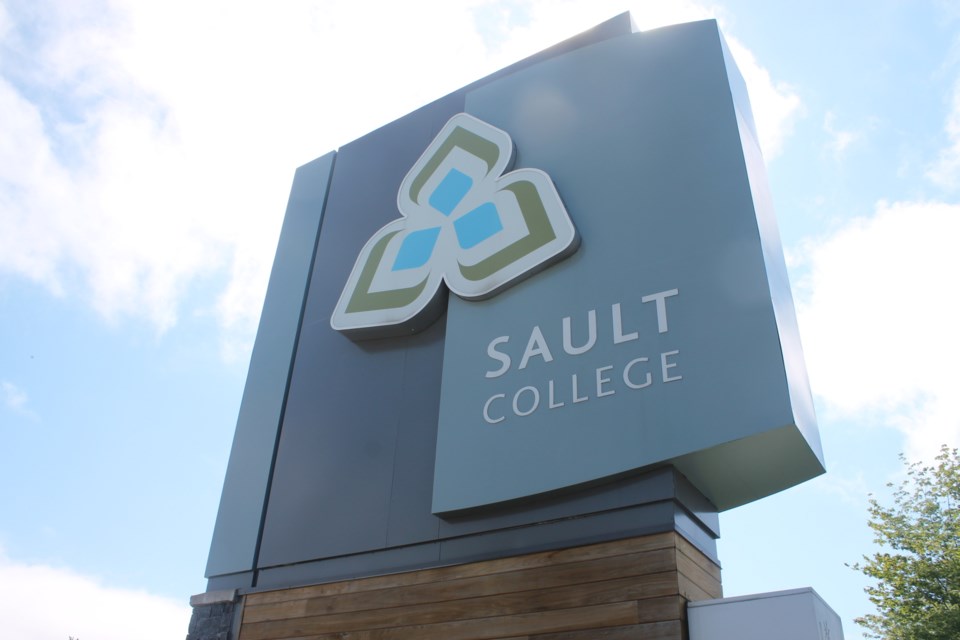With the Ontario community college faculty strike over due to back to work legislation passed by the Ontario government, the Sault College board of governors was provided an update, at its meeting Thursday, on the number of students who have withdrawn from their studies at the college because of the labour dispute.
“What I can say is that right now our primary effort is on working with the students who have withdrawn to try to get them re-register in the college for the winter semester,” said Colin Kirkwood, Sault College vice president, academics and research, speaking to the board.
The college has 15 January start programs in which students may enrol to resume their academic endeavours, Kirkwood said.
“As of today (Dec. 21), of the 255 students who have withdrawn, 40 domestic students have now indicated that they will be returning in the winter semester, and of the 17 international students who withdrew and received a tuition refund, seven of those students have re-registered for the winter semester.”
“So, we’re making some progress on getting students who have withdrawn to come back into the college but we are still a long way away from recovering all of them,” Kirkwood said.
Approximately 26,000 community college students withdrew from school across Ontario’s 24 community colleges, upset with how their academic year was affected by the five-week long faculty strike.
“Most colleges experienced withdrawals somewhere in the range of 10 to 12 per cent, and we were in the same range as most of the colleges in the province,” Kirkwood said.
“The number of students who withdrew post-strike was about twice as many as we would see in a normal year (due to academic difficulty or other reasons)…we will recover some, and we’re working hard to get as many of those back as we can.”
“We know who they are so we’re in touch with them by email and by phone to try and convince them to come back,” Kirkwood told the board.
Issues between the colleges and striking OPSEU-represented faculty went to arbitration, and the details of the arbitrator’s award were delivered Wednesday.
“The parties have seven days according to the legislation to execute the document and in effect create the collective agreement…it is final and binding, and there is no dispute from either party allowed,” said Janice Beatty, Sault College corporate and student services vice president, speaking to the board.
“The award itself looks reasonable to us, it looks like something we can manage and live with so we are generally pleased,” Beatty said.
Highlights from the arbitrator’s award, as stated in a Sault College news release, include:
Academic Freedom
- The arbitrator’s award continues the colleges approach to academic freedom that is grounded in collaboration and preservation of standards.
- The arbitrator did not accept the union’s attempt to remove academic decision making from the college’s academic leadership.
- The consistency of academic content in the classroom has been maintained for our students.
- Continued collaborative academic planning will ensure program consistency for students through continued academic oversight by the colleges to adhere to provincial and professional standards.
Compensation
- The salary award of 7.75 per cent over four years matches the salary position offered by the colleges before the strike started.
Return to Work
- The arbitrator has also removed all faculty grievances, complaints and claims related to the return to work and prevented further claims from being filed in exchange for a one-time payment of $900 to full-time faculty and $450 to partial-load faculty.
OPSEU called for more academic freedom for faculty in delivering course content to students, whereas the colleges insisted on faculty working with community employers in determining course content to students, who are their future employees.
That cooperation between faculty and industry professionals will continue as a result of the arbitrator’s award, both Kirkwood and Willet confirmed to SooToday.
“That remains intact. That has not changed,” Kirkwood said.
“We haven’t looked at all the details (of the arbitrator’s award) but we can tell you the academic freedom language in the collective agreement has never been enshrined in language in the collective agreement that we’re working under…but there is other language which I have yet to delve into,” said Frank Turco, OPSEU Local 613 president, speaking to SooToday after Thursday’s meeting.
“There are definitely language changes, some in the favour of what the union’s proposal was, my understanding is most, but some obviously in favour of the colleges position, but I have yet to look at the details,” Turco said.
The labour dispute between the College Employer Council (the bargaining agent for Ontario’s 24 community colleges in reaching collective agreements with unionized staff) and approximately 12,000 OPSEU-represented community college professors, instructors, counsellors, and librarians, began Oct. 16 and was ended by provincial legislation passed Nov.19, with both faculty and students back in class Nov. 21.
Striking OPSEU-represented faculty wanted more full-time faculty positions, greater job security for part-time faculty and greater academic freedom.
The College Employer Council (CEC) stated OPSEU’s demands for more full-time faculty were financially unrealistic, and offered a 7.75 per cent salary increase over four years and a promise to enhance full-time employment opportunities for part-time teaching staff.
The Ontario Labour Relations Board (OLRB) ordered a faculty vote to be held Nov. 14 to 16 on the CEC’s offer.
OPSEU reported there was a 95 per cent voter turnout and a 86 per cent rejection of the Council’s offer province-wide.
Locally, there was a 92 per cent voter turnout and a 88 per cent rejection of the Council’s offer.
The impasse ultimately led to the government’s tabling of back-to-work legislation.
